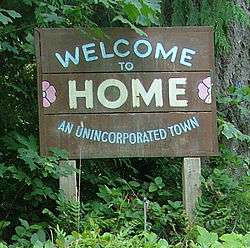Home, Washington
| Home | |
|---|---|
| Unincorporated community (CDP) | |
|
The Home Welcome Sign | |
 Home Location within the state of Washington | |
| Coordinates: 47°16′37″N 122°45′58″W / 47.27694°N 122.76611°WCoordinates: 47°16′37″N 122°45′58″W / 47.27694°N 122.76611°W | |
| Country | United States |
| State | Washington |
| County | Pierce |
| Population (2010) | |
| • Total | 1,377 |
| Time zone | Pacific (PST) (UTC-8) |
| • Summer (DST) | PDT (UTC-7) |
Home is a census-designated place in Pierce County, Washington, United States. The 2010 Census placed the population at 1,377. The community lies on the Key Peninsula and borders the waters of Carr Inlet, an extension of Puget Sound. Home is now primarily a town of beach homes, although around the turn of the twentieth century, it was considered a model, utopian community of anarchists.[1][2]
History
After the failure of the industrial cooperative colony Glennis located east of Eatonville, three former Glennisites — George H. Allen, Oliver A. Verity, and B. F. O'Dell — set out in the summer of 1895 into Puget Sound on a rowboat they built themselves to find an isolated location for a new community.
They decided upon Von Geldern Cove (also known as Joe's Bay) as the site for their new Home Colony, which would be an intentional community based on anarchist philosophy. The founders purchased 26 acres (110,000 m2) there at $7 an acre, working odd jobs to pay for it. By 1896, their families had joined them and cabins were constructed.[3]
By 1898 a land buying corporation was set up called the Mutual Home Association, whose Articles of Incorporation and Agreement stated their purpose as "to assist its members in obtaining and building homes for themselves and to aid in establishing better social and moral conditions." Land was apportioned to those who became members of the Association, agreeing to its anarchist ideals and to pay for their lot.[4] The title to each member's land would stay with the Association; however this was changed in 1909. The Association also held title to a meeting hall, called Liberty Hall, and a trading post.
When Home was plotted in 1901 it had increased in size to 217 acres (0.88 km2) and had become home to anarchists, communists, food faddists, freethinkers, nudists, and others who did not fit in with mainstream society. Elbert Hubbard, anarchist Emma Goldman, and national communist leader William Z. Foster visited and gave lectures.[5]
Following the assassination of President McKinley by anarchist Leon Czolgosz in 1901, the community came under scrutiny from outsiders, especially newspapers in nearby Tacoma. Inflammatory articles led to threats being made by a vigilante committee called the Loyal League formed by members of the Grand Army of the Republic, who planned to invade the colony by steamboat and "put it to the torch." They were stopped when the steamboat owner refused to take them.[6]
In 1902, after charges of violation of the Comstock Act resulting from an article advocating free-love published in the local anarchist newspaper Discontent: Mother of Progress, Home's post office was closed by postal inspectors and moved two miles (3 km) to the smaller town of Lakebay.
The radical feminist Lois Waisbrooker was a resident of Home during a later phase of her controversial career (1901 to 1904), and was involved in the prosecution that led to the closing of the Home post office.[7]
The Association became divided into disagreeing factions called "nudes" and "prudes." The two factions were coined in a series of editorials in the Home newspaper The Agitator in which editor Jay Fox defended Homeites arrested in 1911 for nude swimming — and nude swimming in general — against those in Home who had reported them to county authorities. Because of these editorials, Fox was charged with the misdemeanor of encouraging or advocating disrespect for law or for any court or courts of justice and jailed for two months.[8]
In 1919 the Association was dissolved and the anarchist community, as it was, dissolved as well.
References
- ↑ Charles Pierce LeWarne, Utopias on Puget Sound, 1885–1915, Seattle, University of Washington Press, 1975; pp. 168-226.
- ↑ J. W. Gaskine, "The Anarchists at Home, Washington," The Independent, Vol. 78, pp. 914-22.
- ↑ LeWarne, pp. 168-71.
- ↑ LeWarne, pp. 171-3.
- ↑ LeWarne, pp. 175-6, 199.
- ↑ LeWarne, pp. 177-82.
- ↑ LeWarne, pp. 183-4.
- ↑ LeWarne, pp. 206-20.
External links
| Wikivoyage has a travel guide for Home. |
- Fortnightly Club of Redlands: Home Colony, Its Philosophy & Beginnings*Seattle PI: No Place Like Home — this is very likely (but not certainly) the article quoted at length, perhaps in full, at http://dir.groups.yahoo.com/group/smygo/message/730
- Labor Press Project: Discontent: Mother of Progress: Information on the anarchist newspaper published from Home between 1898 and 1902. Contains excerpt from the "Articles of Incorporation and Agreement of the Mutual Home Association".
- Labor Press Project: The Agitator: Information on the anarchist newspaper published from Home between 1910 and 1912. Contains excerpts from "The Nude and the Prudes" and other articles.
- Stamping Out Indecency The Postal Way: Home's legal troubles with the Comstock Act.
- The Anarchist Encyclopedia: Home Colony, Washington
- "A Nest of Vipers in This Country": An article about the vilification of Home Colony and its leaders by the Tacoma press.
- The Anarchists of Home: An episode of Northwest Now on KBTC-TV that features Home and authors Wadland and LeWarne.

